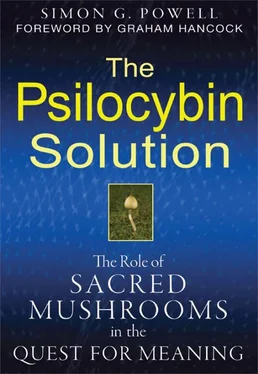As far as I can see, if we don’t infer that Nature is smart, we can’t explain why exactly Nature should allow, and indeed encourage, biological evolution. Why, for instance, should the emergence of self-replicating, self-repairing DNA be an inevitable consequence of the laws of Nature? Why does DNA have language-like properties that can be expressed through proteins? Why are millions of proteins able to effortlessly fold into exquisite organismic patterns? Why, through genetic variation, is life continually able to forge solutions to various problems? How come there is a biological way forward most of the time? Why are DNA and genes so plastic and flexible? Why, indeed, is Nature made of such elegantly versatile, Lego-like components? And why should something as amazing as consciousness eventually be facilitated by life? The questions go on. The fortuitously creative brute facts mount up. The smart self-organizational properties of Nature abound. Something important is clearly happening everywhere.
The Ultrasmart Complexity of Organisms
Allow me to reiterate a previous reiteration: your own self-repairing body, your visual system processing these words, your autonomic breathing system and autonomic digestive system—all are far more smart than any manufactured computer or fabricated device currently in existence (especially when one considers how the body’s various functions are integrated into a coherent and enduring unity). Perhaps you are familiar with some latest piece of computer software, some brand-new nifty program embodied in computer code. You will certainly concede that this code is smart. Yet reflect on the huge store of digital DNA coding etched into almost every one of your many trillions of body cells and you will realize that human-derived programs pale in the face of those written by Nature. This becomes more apparent if we bear in mind that the DNA is essentially the same in all our cells, whether liver cells, lung cells, skin cells, or brain cells. Yet somehow that self-same information can be expressed in many different ways. The final orchestrated result—a living organism—is so wonderfully complex as to defy a complete understanding.
Somewhat paradoxically, I would suggest that it is precisely because Nature is so very, very smart that we do not acknowledge it. Biological processes, in the main, are so perfected in their natural execution that we fail to comprehend just how much complexity is involved (recall my detailed discussion of neuronal events, for instance). It is only when biology goes wrong that we suddenly become aware of just how ingenious it usually is in its operation. And yet, more often than not, we do not awake in the morning with a broken eye, a crashed memory module, a faulty connection in our ear, or an intermittent lung. Unlike our machines, our nervous systems do not tend to blow a fuse or suffer incongruous shutdowns. Thus, for the most part we may take life for granted and fail to grasp the very real miracle of our conscious organic existence. Similarly, if computers were so perfectly designed that people were able to utilize them for a thousand years without one single breakdown, we would soon lose sight of just how smartly they were designed. We would become completely accustomed to computers and take them for granted without a thought as to their intelligently designed infrastructure. However, should malfunctions begin to occur, we would suddenly wake up to their underlying contrived functionality.
Returning to human biological processes, they are generally so impeccable that they take care of themselves, which is to say that Nature is a pretty smooth operator. For most of us, we grow from babies to adults faultlessly, yet the myriad steps in this morphological feat are absurdly sophisticated. Think of a couple of identical twins and the amount of steps involved in turning them from microscopic single-celled entities into macroscopic trillion-celled entities. Yet after all that incomprehensibly complicated development, they both look exactly the same!
Such fine biological precision is a creative manifestation of what I am calling natural intelligence—a naturally smart process that has yielded as part of its output we beings endowed with consciousness, a process moreover that has been operating over an immense stretch of time. Yet just because the information-gaining evolutionary process that led to you and I took billions of years does not mean that it is nonintelligent, as we have been led to believe. To surmise that high intelligence exists only in our species is to be blind to both the natural intelligence that facilitated evolution and the natural intelligence embodied in all biological systems.
We have arrived back at the idea of the Universal Computation (or cosmic seed even), for it would appear that all the information necessary to construct suns, planets, molecules, amino acids, cells, microorganisms, plants, animals, and conscious brains was somehow written into primeval Nature, lying dormant as it were until the right conditions had developed somewhere and somewhen in which this information could be “read out.” This is a breathtaking idea, and if it should generate a small gasp of wonder, this is but nothing compared to the awe generated by entheogens like the psilocybin mushroom, an awe that is intimately connected to realizations of our potential significance, as conscious agents, in the reality process.
Nature thus emerges as being incredibly smart as well as deadly, and I can close this chapter with an apt quote by Einstein, this time pertaining to the reverence felt by at least some scientists toward the Universe with which we interface. Einstein openly notes that this emotion “takes the form of a rapturous amazement at the harmony of natural law, which reveals an intelligence of such superiority that, compared with it, all the systematic thinking and acting of human beings is an utterly insignificant reflection.” {46} 46 4. Einstein, The World as I See It, 28.
I almost second that emotion. Human thinking might not be an “insignificant reflection” at all. Far from it. Indeed, I presume that if we divine natural intelligence, acknowledge it, and really feel it, then this represents a highly refined reflection of that intelligence . Which implies that such a cortex-embodied reflection is of functional import, facilitating a sort of self-realization factor of natural intelligence as it were. We explore these issues in the next chapter.

TEN
A Neo-Shamanic Climax
As we have seen, the impressive fine-tuning of Nature is most clearly indicated in the evolutionary process that Nature has facilitated here upon the Earth. Over some three and a half billion years, our planet has transformed itself from a lifeless mass of rock into a veritable metabolizing organic matrix in which countless elegantly patterned organisms swarm about the Earth’s surface, each organism an informational expression of natural intelligence. Yet, like the hour hand of a clock, scientists have failed to discern the context-driven intelligence of evolution, claiming instead that evolution is essentially a dumb and mindless process. But this can only be a subjective inference likely drawn according to the perceived duration over which evolution manifests, a duration so great that the intelligence operating over such a span remains all but invisible. If we instead imagine viewing a time-lapse film of the biosphere wherein three and a half billion years of information-gaining evolution are compressed into but one intense second, then modern electronic human culture and human consciousness explode instantaneously into existence, bursting forth out of the Earth’s ocean of elemental constituents. This awesome pattern of self-organization can be no mere accident. To those who would still scoff at this assertion, I can only ask them this: If the aforementioned capacity of the Universe does not suggest a great intelligence at work, then what sort of Universe would?
Читать дальше











